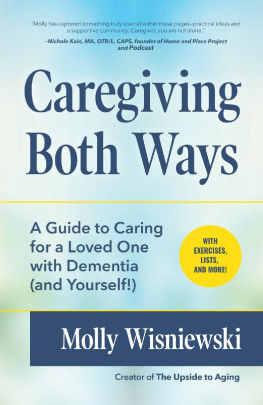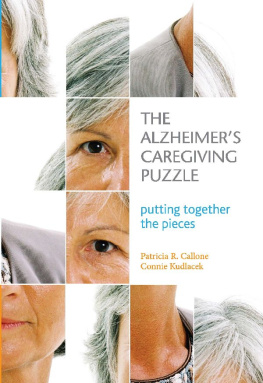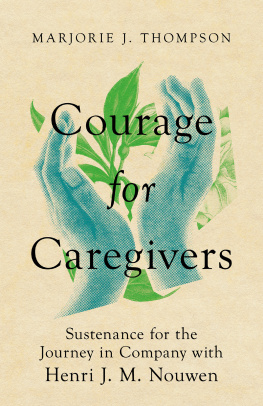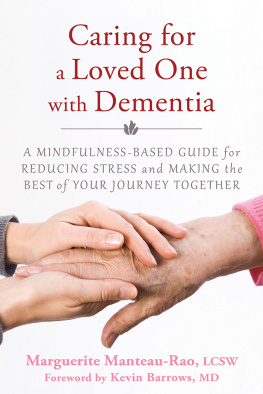A Caregiver s Guide
ADULT DAY SERVICE
Are you concerned about changes you are seeing in your loved one? Do you question whether you are making the right decisions as you navigate new care needs for them? The Joyful Journey Caregivers Guide is meant to be a quick reference for you to have in your tool belt as you travel along on your caregiving journey. What you are doing is very important, but you do not need to travel this sometimes painful, sometimes exhausting path alone. In fact, it is our belief that your and your loved ones health and happiness depend upon building a support system to help you along the way.
Our hope is that you will find inspiration, validation, and practical skills that will help you get pointed toward the support and resources you need. For example, Chapter 1 discusses six signs that indicate you and your loved one need extra support. If you have noticed memory issues in your loved one, you may want to jump straight to Chapter 6: Spotlight on Alzheimers and Dementia. Read the guide as a whole or pick and choose to read what you need, when you need it.
Introduction
Caregiving is a journey. Let us help you find the right path.
Table of Contents
The Joyful Journey Guide to Caregiving
Building authentic relationships with the people in our care is central to the Joyful Journey approach, which is why we call the folks we serve our Friends. Additionally, the Joyful Journey house was built to intentionally look like a house on the outside and feel like a warm, inviting home on the inside. We want the people who come to us for services to feel like they are visiting good friends at their house!
If youre reading this, chances are you have an adult in your life who needs additional support during the day. Whether this is a new development or youve been caring for your loved one for years, this Ebook is one more resource to help you provide the best care possible.
Our Friends
At Joyful Journey , our mission is to provide socially engaging activities that enhance quality of life, well-being, and independence for adults experiencing changes in mobility or cognition. We strive to provide families an alternative option for compassionate care outside the home while offering respite and support for the primary caregiver. Through intentional, person-centered programs, our team is committed to providing meaningful days filled with purpose for each Friend who comes to visit our house*.
We invite you and your loved one to our house to make new Friends!
Welcome
Chapter
Recognizing the Signs
There may come a time when you realize your loved one needs additional care and support. Knowing when the time is right to seek out this support can be complicated. Weve put together some of the basic signs to help inform your decision-making process.
- Moving from independent to dependent
Your loved one has become increasingly more dependent on you to attend to daily necessities of life. You consider yourself their caregiver. This can be the right time to start introducing additional care providers and support. By building these new relationships early, your loved one will hopefully have an easier time adjusting to new people, new situations and more dependent living. There may be a number of transitions you encounter, some of which you can handle solo, but just remember--its okay to ask for help.
- Life-changing event
A life-changing event has occurred and your loved ones needs have changed. Consulting a healthcare professional, like a trusted physician, is a great place to get guidance when trying to anticipate next steps in care. Some life changing events can include:

- Physical changes
Changes in your loved ones physical abilities can also indicate the need for more support outside of the home. Providing the appropriate amount of physical activity that meets our loved ones needs as they age can be difficult. Activities they once loved can be too strenuous or dangerous, which leads them to withdraw from physical activity altogether. If your loved one is experiencing longer periods of inactivity, muscle tone and strength will begin to diminish. Changes in vision as we age can also impair balance and mobility. Some signs of physical changes include:

- Cognitive changes
With cognitive changes, as with physical changes, it can be difficult to tell if a problem is ongoing or if your loved one is just having a bad day. As we age, we can experience forgetfulness or take a moment to recall information or memories. This isnt always a sign of an underlying condition or that additional care is needed. If you have concerns about the following symptoms of cognitive decline, please contact your physician:

- Changes in emotional state
You may notice your loved one is becoming more easily agitated and angry or they may withdraw from social interactions. You might suspect they are feeling depressed or have lost their sense of purpose because they are spending more time alone or in their room. Some of this can be part of the natural aging process, but in some cases, it can be the sign of an underlying issue. It is always a good idea to consult a physician if you notice any of these changes, including a general change in your loved ones personality.
Chapter 1 Review
As your loved one ages, you may want to be on the lookout for changes that can signal a need for caregiving support.
1Becoming more dependent on you
2Medical diagnosis or loss of mobility
3Balance & strength issues or falls
4Confusion, wandering, persistent forgetfulness
5Increased anger, agitation, or depression
Become 

Chapter 2
Building a Care Team
Whether you are new to caregiving or youve been someones primary caregiver for a longer time, bringing in reinforcements and building your care team can be a lifesaver.
Why do you need help?
As your loved ones health and abilities begin to change, your health may begin to change as well. If you are in the sandwich generation, you may need additional support to maintain your employment status while raising children. Caregiving for someone with declining abilities or chronic illness requires round the clock vigilance. The constant state of alertness combined with assisting someone throughout the day can leave you physically, mentally, and emotionally exhausted.
Caregiver Fatigue
This state of exhaustion is often referred to as caregiver fatigue or caregiver burnout and it will eventually have a negative effect on your health and well-being if ignored.
Increasing Needs
Another scenario is where your loved one begins to depend on you with increasing frequency. As their needs progress, there may be some aspects of their care that are outside of your skill set or that you are uncomfortable doing. You may even find moments in your loved ones care routine where they refuse your help, even though they can not complete the task safely without you!
Adding support people to the care routine when you begin to notice these types of situations can be a great way to relieve stress and tension in the relationship. This is why we recommend starting to build what we call your care team.













